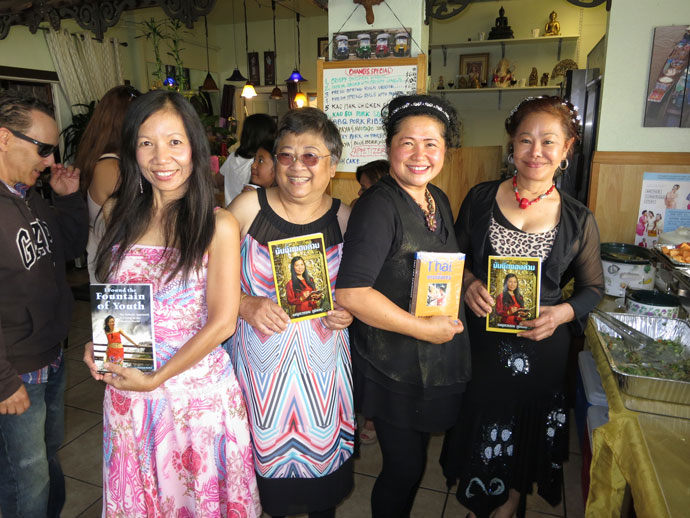อยากมีแฟนฝรั่ง ฟังทางนี้ ตอนที่ 5
ข้อมูลเกี่ยวกับข้อตกลงก่อนการสมรส
ผมเป็นทนายความอยู่ที่เมืองพาโล อัลโต (Palo Alto) จบ I am a lawyer in Palo Alto (Stanford Law, 1968). Many years ago (1969-1974), I worked with the American Embassy in Thailand and learned to speak Thai. My wife, Nattaya, is Thai. In part, because of this connection, I have worked on a number of cases involving Pre-Marital Agreements between young women from abroad marrying American men. I have found that there are a number of important things to think about, both for the woman and for the man.
ประเด็นที่จะกล่าวถึงต่อไปนี้จะเน้นถึงการปกป้องภรรยาและสิทธิของเธอเพื่อให้แน่ใจว่าข้อตกลงก่อนการสมรสนั้นจะสามารถนำมาใช้ได้ในขั้นศาลในกรณีที่มีการหย่าร้างเกิดขึ้นและเพื่อหลีกเลี่ยงการปฏิบัติหน้าที่ที่ไม่ถูกต้องของทนายความของผู้เป็นภรรยา ในขณะเดียวกัน ผลประโยชน์และสิทธิของผู้เป็นสามีก็จะต้องได้รับการปกป้องเช่นเดียวกัน ในเอกสารนี้ คำว่า “สามี” สามารถสลับกับคำว่า “ภรรยา” ได้ ถ้าสามีเป็นชาวไทยและภรรยาเป็นชาวอเมริกัน
The following thoughts are focused on protecting the Wife and the Wife’s rights, making sure the Pre-Marital Agreement will stand up in court in case of divorce, and avoiding malpractice on the part of the Wife’s attorney. At the same time, it is important that the Husband’s interests and rights be protected as well. In all the following, the word Husband” could be substituted for “Wife”, if the roles are reversed.
ในหลายกรณี ฝ่ายหญิงต้องการมาอาศัยในสหรัฐอเมริกากับสามี หรือเธออาจจะอยู่ที่นี่แล้วก็ได้โดยวีซ่าคู่หมั้นและจะต้องแต่งงานภายใน 90 วัน หลายกรณีที่ฝ่ายหญิงพูดภาษาอังกฤษไม่ดีพอหรือไม่ค่อยมีการศึกษาหรือไม่ค่อยมีประสบการณ์ด้านการทำงาน มักจะไม่มีงานทำในอเมริกา มักจะไม่มีรายได้และมักจะไม่มีทรัพย์สินหรือมีแต่เพียงเล็กน้อย
In many cases, the woman wants to come to live in the US with her Husband. Or she may be here already on a fiancee visa and needs to get married within the 90 day limit. It is often the case that the woman does not speak English well, may or may not be well-educated or have good work experience, usually does not have a job in the US, usually does not have any income, and usually has little or no property.
ในทางตรงกันข้าม ฝ่ายสามีมักจะมีอายุแก่กว่ามาก อาจจะมีบุตรที่โตแล้ว มีทรัพย์สิน มีรายได้ (จากการทำงานหรือเงินเกษียณ) และอาจมีธุรกิจเป็นของตนเองซึ่งเป็นสิ่งที่เขาต้องการจะปกป้องในกรณีที่การสมรสใหม่นั้นล้มเหลว
On the other hand, the Husband is often quite a bit older, may have grown children, has property already, has income (either from earnings or retirement), and may own and operate his own business, all of which he wants to protect in the event the marriage does not work out.
ขอให้จำไว้ว่ากฎหมายของรัฐแคลิฟอร์เนียว่าด้วยการสมรส การหย่าร้างและการรับมรดกนั้นค่อนข้างยุติธรรม ด้วยเหตุผลอันนี้จำนวนของผู้ที่ทำข้อตกลงก่อนการสมรสจึงมีน้อย ไม่ใช่สิ่งที่คู่สมรสทั่วไปกระทำกัน ดังนั้นเป็นสิ่งสำคัญอย่างยิ่งที่ไม่ควรสละสิทธิของตนอย่างดายที่กฎหมายที่ออกมาเพื่อปกป้องตัวคุณ
It is important to remember that California laws regarding marriage, divorce and inheritance are basically fair. For that reason, only a very small percentage of people have Pre-Marital Agreements. They are not the usual thing. So it is important not to give up easily rights that the law is otherwise careful to protect.
เกือบจะทุกครั้งที่ผู้มีทรัพย์สินและรายได้ที่ต้องการให้มีข้อตกลงก่อนการสมรสคือเป็นผู้ที่เป็นสามี (หรือว่าที่สามี) จากประสบการณ์ของผม ผู้เป็นสามีจะไปหาทนายความของตนและให้ทนายความร่างข้อตกลงก่อนการสมรสที่เรียกร้องให้ผู้เป็นภรรยา (หรือว่าที่ภรรยา) สละ 1. สิทธิในการได้รับค่าเลี้ยงดู 2. สิทธิในด้านทรัพย์สิน และ 3.สิทธิในการได้รับมรดก ผู้เป็นสามีก็จะหาทนายความให้กับผู้เป็นภรรยาและขอให้ทนายความคนนั้น “อธิบาย” ข้อตกลงก่อนการสมรสให้ผู้เป็นภรรยาและให้ทนายเซ็นอนุมัติข้อตกลงก่อนการสมรสนั้นเพื่อที่จะแสดงว่าผู้เป็นภรรยาได้รับคำแนะนำจากทนายความแล้ว ขั้นตอนนี้ทั้งผู้เป็นสามีและผู้เป็นภรรยาคาดว่าจะใช้เวลาของทนายความเพียง 2 หรือ 3 ชั่วโมง
It is almost always the one who has property and income who wants the Pre-Marital Agreement, usually the Husband (Husband to-be). In my experience, the Husband goes to his own lawyer, and has the lawyer draft a Pre-Marital Agreement that calls for the Wife (Wife to-be) to give up: 1. spousal support rights; 2. property rights; and 3. inheritance rights. Husband then finds a lawyer for the Wife and asks that lawyer to “explain” the Agreement to Wife and “sign off” (sign as approving) on the Agreement showing the Wife was advised by a lawyer; Husband and Wife often expect this should only take 2 or 3 hours of the lawyer’s time.
ทั้งหมดนี้มันเป็นสิ่งที่เลวร้ายมาก ถ้าทั้งสองเกิดสมรสกันเป็นเวลานาน แล้วมีการหย่าร้างเกิดขึ้น หรือถ้าฝ่ายสามีเกิดเสียชีวิตขึ้นมา ผู้เป็นภรรยาก็อายุปาเข้า 50 (แค่ยกตัวอย่าง) โดยที่ไม่มีเงิน ไม่มีทรัพย์สิน อาจจะไม่มีงานทำ หรืออาจจะมีลูกให้เลี้ยงดู อาจจะมีปัญหาที่คล้ายคลึงกันหากผู้เป็นสามีเกิดพิการขึ้นมา ไม่ควรมีทนายความคนไหนที่จะยอมอนุมัติให้ข้อตกลงก่อนการสมรสแบบนี้มีขึ้น และลูกความก็ไม่ควรที่จะไปขอให้ทนายความอนุมัติข้อตกลงก่อนการสมรสดังกล่าว
All of this is TERRIBLE. If the couple stays married for a long time, then gets divorced, or if the husband dies, the wife could find herself (at the age of 50, for example) with no money, no property, possibly no job, possibly with children to raise. There may be similar problems if the Husband becomes disabled. No lawyer should ever approve such an agreement. No client should ask a lawyer to approve such an agreement.
ค่าเลี้ยงดูคู่สมรส เมื่อประมาณ 10 ปีก่อนหน้านี้ กฎหมายไม่อนุญาตให้คู่สมรส (หรือว่าที่คู่สมรส) ยอมตกลงในข้อตกลงก่อนการสมรสที่จะสละสิทธิที่จะได้รับค่าเลี้ยงดูในกรณีที่มีการหย่าร้างเกิดขึ้น มีศาลแห่งหนึ่งได้เสนอว่า ให้มีขึ้นได้ถ้าทั้งสองฝ่ายสามารถช่วยเหลือตนเองได้ซึ่งจะดูจากทรัพย์สินและรายได้ที่มีอยู่ แล้วต่อมาสภานิติบัญญัติของรัฐแคลิฟอร์เนียก็ได้อนุญาตให้สละสิทธิที่จะได้รับค่าเลี้ยงดูในข้อตกลงก่อนการสมรส ถ้าทั้งสองฝ่ายมีทนายความในตอนที่ทำข้อตกลงนั้น จึงเห็นได้ว่าเป็นความรับผิดชอบของทนายความที่จะดูว่าลูกความของตนจะสามารถดูแลตนเองได้หรือไม่โดยดูจากทรัพย์สินและรายได้ที่มีอยู่ ทนายความไม่ควรอนุญาตให้ลูกความสละสิทธิหรือลดสิทธิของตนว่าด้วยค่าเลี้ยงดูอันนี้ ถึงแม้ว่าลูกความจะต้องการเช่นนั้นก็ตาม ถ้าทนายความยอมให้ลูกความของตนสละสิทธิอันนี้ แสดงว่าทนายความผู้นี้ละเมิดต่อหน้าที่(ทำผิดในหน้าที่) ทนายความผู้นี้อาจจะถูกฟ้องข้อหาปฏิบัติหน้าที่บกพร่องอีกหลายปีต่อมาได้ถ้าลูกความเกิดมีความจำเป็นที่จะต้องได้รับเงินค่าเลี้ยงดูในอนาคต แต่กลับไม่ได้เงินนั้นเพราะได้เซ็นสัญญาตกลงในข้อตกลงก่อนการสมรสนั้นไปแล้ว
SPOUSAL SUPPORT: Until about 10 years ago, it was not legally possible for a proposed spouse to agree in a Pre-Marital Agreement to give up spousal support in the event of a divorce. One court suggested that it might be OK if both parties were self-reliant with regard to property and earning capacity. The California state legislature then allowed spousal support to be given up in a Pre-Marital Agreement, IF the parties were represented by lawyers at the time the agreement was made. From this it can be seen that it is part of the responsibility of the attorney to see that his client is self-reliant with regard to property and earning capacity. He should not otherwise permit a client to give up, or severely limit, spousal support–EVEN IF THE CLIENT WANTS TO DO SO. For the lawyer to follow the client’s wishes in this case would be to violate his duty. The lawyer could also be setting himself up for a legal malpractice law suit years down the line if the client later needs spousal support and does not get it because of the Agreement.
สิทธิในด้านทรัพย์สิน เนื้อหาที่ถูกนำเสนอในข้อตกลงนั้นมักจะขอให้ผู้เป็นภรรยาสละสิทธิทั้งในทรัพย์สินส่วนตัวของสามีและในทรัพย์สินส่วนรวม (ทรัพย์สินที่มีร่วมกันที่ได้มาหลังการสมรส แต่ไม่ทั้งหมด) โดยปกติแล้ว ทรัพย์สินส่วนตัวมักจะไม่มีปัญหา ยกเว้นบางกรณีเท่านั้น ทรัพย์สินส่วนตัวเหล่านั้นจะเป็นของสามีอยู่แล้ว มันจะเริ่มเป็นปัญหาตรงที่ถ้าภรรยาใช้เวลา หยาดเงื่อแรงงานหรือเงินของตนเพื่อให้ทรัพย์สินส่วนตัวของสามีมีมูลค่าสูงขึ้นแต่เธอกลับไม่ได้รับผลประโยชน์ใดๆ จากทรัพย์สินส่วนตัวเหล่านั้นของสามี ยกตัวอย่าง ถ้าเธอช่วยสามีทำบัญชีในธุรกิจของเขา หรือเป็นพนักงานขายให้กับบริษัทให้ฟรี แรงงานที่ภรรยาให้สามีฟรีนั้นไม่ควรถือว่าฟรีหรือไม่ควรถือว่าเป็นทรัพย์สินส่วนตัวของสามีฝ่ายเดียว
PROPERTY RIGHTS: Proposed agreements often call for the wife to give up rights to Husband’s Separate Property and to Community Property (CP = most property acquired after marriage, but not all). With a few exceptions, Husband’s Separate Property is not usually a problem. It belongs to the Husband. It does become a problem if the Wife contributes time, work, or money to increase the value of the Husband’s separate property, but acquires no interest in the separate property. For instance, if she works for free as a book-keeper in his business, or as a salesperson. Free labor from the Wife should not be expected or allowed.
ไม่มีเหตุผลใดที่ผู้เป็นภรรยาจะต้องสละสิทธิในทรัพย์สินส่วนรวมซึ่งเป็นทรัพย์สินที่มีร่วมกันที่ได้มาหลังการสมรส ตามกฎหมายของรัฐแคลิฟอร์เนียเธอมีสิทธิที่จะได้ครึ่งหนึ่งอยู่แล้ว แต่ข้อตกลงก่อนการสมรสบางฉบับต้องการให้ผู้เป็นภรรยาสละสิทธิในผลกำไรที่มาจากทรัพย์สินส่วนรวมที่เป็นรายได้ที่มาจากกำทำงานของผู้เป็นสามีในขณะที่อยู่กินด้วยกัน(แต่งงานกัน) ไม่มีเหตุผลใดที่ผู้เป็นภรรยาจะต้องสละสิทธินั้น ผมขอย้ำอีกครั้ง ตามกฎหมายแล้วครึ่งหนึ่งของรายได้ของเขาจะต้องเป็นของเธอ ไม่ใช่ของเขาคนเดียว มันป็นทรัพย์สินของทั้งสองคน
There is no reason a Wife should give up rights to community property, property acquired after the parties are married. By California law it is one-half hers. Some Agreements, in particular, want the Wife to give up her Community Property interest in the Husband’s income earned during marriage. There is no reason she should do this. Again, by law one-half of that income belongs to her-----it is not “his”, it is “theirs”.
สิทธิในการได้รับมรดก เช่นเดียวกับย่อหน้าข้างบน เนื้อหาที่ถูกนำเสนอในข้อตกลงนั้นมักจะขอให้ผู้เป็นภรรยาสละสิทธิในการได้รับมรดกซึ่งอาจจะทำให้เธอไม่มีอะไรติดตัวเลย ถึงแม้จะแต่งงานกันมาได้ 10, 20, 30 ปีแล้วก็ตามถ้าไม่มีการเปลี่ยนแปลงเนื้อหาของข้อตกลงหรือถ้าสามีไม่ได้เขียนพินัยกรรมว่าจะทิ้งสมบัติไว้ให้เธอ ผมขอย้ำอีกครั้งว่าผู้เป็นภรรยาไม่ควรที่จะสละสิทธิอันนี้ ผู้เป็นสามีสามารถที่จะเขียนพินัยกรรมเพื่อที่จะยกทรัพย์สินส่วนตัวของเขาให้กับลูกๆ หรือใครก็ได้ที่เขาต้องการได้ตลอดเวลา เขาสามารถที่จะยกครึ่งหนึ่งของทรัพย์สินส่วนรวมของเขาให้กับใครก็ได้ ไม่ควรที่จะสละสิทธิอันนี้
INHERITANCE RIGHTS: As above many proposed Agreements call for the Wife to give up inheritance rights, so that she might end up with nothing—even after 10, 20, 30 years of marriage----if the Agreement is not changed or if the Husband fails to write a Will leaving anything to her. Again, there is no reason to do this. A Husband can ALWAYS write a Will to leave all his separate property to his children, or to whomever he wishes. He can do the same with his ½ share of Community Property. These rights should NOT be given up.





































